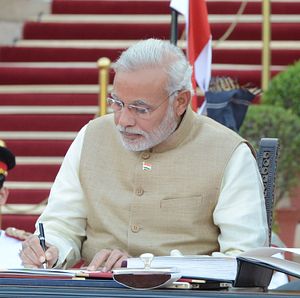As India goes to the polls, national security has become the defining issue of these elections, much to the surprise of many. It was not expected to happen and it was being argued that unemployment and jobs as well as farmer distress would be the central themes on which these elections would be fought. It is not readily evident at this stage if the Indian electorate is going to choose the next government because of its national security credentials but here we are at the beginning of a long election cycle and India’s Pakistan policy and its military posture is being widely discussed and debated – by the government, by the opposition, as well as by the general public.
In some ways, what happened in Pulwama in February and India’s robust response to Pakistani shenanigans had made sure that these issues would find their way into the electoral discourse. The Narendra Modi government’s decision to let the Indian Air Force’s (IAF) Mirage 2000 fighter jets strike the terror camps in Balakot, Muzaffarabad and Chakoti in Pakistan is also an important marker in India’s approach to counter-terror, which has been hobbled by the Pakistani nuclear bluff. India has all but called that bluff, and Pakistan’s decision to downplay the strikes underlines Islamabad’s reluctance to retaliate. India has learned from the past, when the international community would come down on it seeking de-escalation after every Pakistani provocation. It is now for Pakistan to decide if, and how far, it wants to climb up the escalation ladder.
There are many in the country who are consumed by the tactical and operational details of IAF operations; the reality is that the strategic equation between India and Pakistan has been altered for good. This is reflected in Pakistani attitudes where the threat of more Indian attacks is palpable. After managing to isolate Islamabad globally, New Delhi moved swiftly to use the instrument of force, thereby not only imposing costs on Pakistan for its use of terror but also demonstrating its ability to undertake a sub-conventional war below the nuclear threshold.
Given the significance of Indian shift, it was inevitable that Modi’s Bharatiya Janata Party would bring the military action into the electoral discussion. It is illogical to say that the government should get no credit for such a move when the use of the military is an inherently political decision and Modi’s political leadership is one of the most important reasons for the Indian strategic shift. Ironically, the harder the opposition tries to take the credit away from Modi, the easier it becomes for him to get it.
It is also a bit disingenuous to suggest that national security and foreign policy should not be matters of political contestation. In a democracy, especially during elections, it is the voter’s right to know and understand the distinction among the political parties in how they will deal with foreign and national security challenges facing the country. In all democracies, from the United States and the United Kingdom to Australia and Japan, foreign policies are vigorous contested and debated. It is true that foreign policies of major powers don’t radically change with changes in governments, but different political parties and different political leaderships put their own imprimatur in their conduct. So as a nation we should welcome the debate on national security and foreign policy that is happening today.
It also underscores the BJP’s effective management of its electoral machinery. The BJP is fighting the elections on the ground where it is most confident – national security and nationalism. The opposition has failed to take the conversation to where it should have been engaging the Modi government – jobs and the agricultural crisis. Modi has been framing the political narrative for months now and the opposition has been reduced to responding to it with no signs of unity, coherence and purpose. The Congress Party’s inability to articulate a cohesive response to challenges posed by Modi is the biggest stumbling block. In fact, long before Pulwama, Congress had been trying to make this election about the Rafale deal and the purported corruption charges against Modi. Despite a long campaign, it doesn’t seem to have cut much ice with the people and post-Pulwama the urgent need for modernizing India’s aging air fleet has been underscored even more, further undercutting the ‘Modi chor hai’ (Modi is a thief) argument of the opposition.
As the center of gravity of Indian politics moves to the right, a vigorous debate on Indian foreign policy and national security priorities is not only necessary but almost inevitable. As the BJP takes the lead in defining the national agenda on these issues, the Indian left needs to introspect where it went wrong and how by devaluing nationalism it managed to make itself redundant in the national security domain. Modi and the BJP are articulating a national security and foreign policy framework that is more in sync with the aspirations of the majority as of now. And that is what seems to have given them an edge in these elections.

































